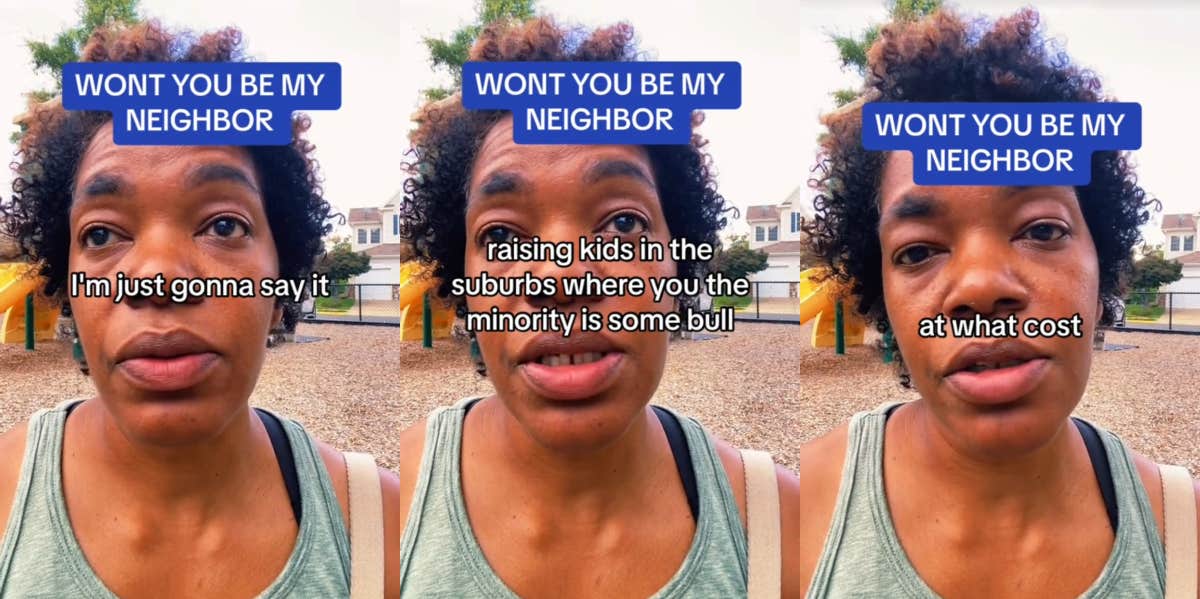Woman Compares What It Was Like Raising Kids 'In The Hood' Versus The Suburbs — 'The Best Opportunities At What Cost?'
She's missing out on a sense of community while gaining a quality education — but at what cost?
 @mamasay.mamasaw / TikTok
@mamasay.mamasaw / TikTok A Black mother living in the suburbs recently revealed what life was like raising her kids as part of the minority group in her community. She was honest, open, and blunt about how difficult it was to feel like she or her children belonged.
She compared it to her life in her old neighborhood and weighed the pros and cons of both for over a million people to see, providing endless support for her in the comments.
She’s trying to give her kids the best opportunity in life, but asks: at what cost?
The mother (@mamasay.mamasaw) gets straight to the point from the beginning of her video, saying, “Raising kids in the suburbs where you’re the minority is some bull.” She understands that the whole purpose of her moving to a wealthier neighborhood is to grant her kids access to better opportunities, but it doesn’t feel good when you have to worry about everything else.
While her kids are just kids, it’s still pretty easy for them to get along with their peers. They look at what they have in common, “maybe it’s hair color or eye color, maybe it’s language, maybe it’s anime, maybe it’s gender or music,” and they become friends just like that.
But once they get older, she says, things get a little more complicated because they’ll start to notice how different they truly are and how much their race affects them, and they’ll start to feel marginalized. “Always on the fray of things but not in the mix of it,” she explains it.
Conscious and unconscious biases will rear their ugly heads, and all of a sudden your kids are being left out of things like being picked for a sports team or a dance solo, “and you don’t wanna pull out the race card and say that’s it, but you might feel it in the pit of your stomach.”
She worries about her children feeling lonely at a time when they’re trying to figure out who they are.
According to an article from the Journal of School Health, “Young people with marginalized identities are more likely to feel lonely compared to those who are not marginalized.”
“Possible explanations for increased loneliness in individuals with marginalized identities include a lack of financial resources to be able to engage in social activities and being socially excluded due to prejudice and discrimination towards their identities,” they added.
Furthermore, this marginalization might prevent them from seeking help with handling their loneliness or the discrimination they suffer from. This mom claims that in “the hood,” she doesn’t have to worry about these kinds of things.
She claims that people in ‘the hood’ foster a compassionate community with ease.
“Now, one of the things I noticed is when I went back home to the hood — and yeah, the area looks depressing, the buildings are dilapidated or whatever — but going into the store, there is a real sense of community amongst my own that I didn’t notice before,” she said.
She took for granted the way that she would organically converse with other people in the aisles or the way that other people were kind to her kids when talking to them, using cute pet names like “sugar,” “honey,” or “baby.”
“It’s a subtle thing, I get it, but it’s [a] connection, and it builds a sense of community in ways that you don’t even think about,” she explains and goes further to talk about the connection that she feels is lacking in the other Black moms in her suburban neighborhood.
“Why aren’t we speaking to each other? What is with the ‘wave and keep walking’ if we do?” she asks. “Other ethnicities unapologetically get together in the playground, on the corners, [and] start hanging out together. I think we’re afraid to look like we’re about to start an uprising.” She speaks to how these women might feel that they need to conform to the community they live in by not getting too close to each other as minorities or else it will look bad to everyone else.
Trying to perform this balancing act of harboring a sense of community and having the best educational opportunities is a hard one. One that makes this mom feel lonely and makes her worry that soon her children will have to deal with it.
Isaac Serna-Diez is an Assistant Editor for YourTango who focuses on entertainment and news, social justice, and politics.

